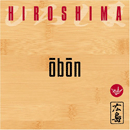 Personnel: Personnel:
Dan Kuramoto – tenor sax, soprano sax, flutes, shakuhachi
June Kuramoto – koto
Kimo Cornwell – piano, keyboards
Danny Yamamoto – drums
Shoji Kameda – taiko, percussion
2005 marks Hiroshima's 25th anniversary in the recording industry. As a present to us, they give us Obon, their 13th release.
Obon is an all instrumental offering. It encompasses the many people, places, and things that have influenced the musicians who comprise Hiroshima. As with most of Hiroshima's music over the years, the recurring theme throughout is the blending of sounds – traditional with contemporary, Latin with jazz, and Asian with the many forms American music takes.
The CD opens with “Swiss Ming,” Dan Kuramoto's nod to saxophonist Eddie Harris. This is classic Hiroshima, with Dan leading the band on his tenor sax in an up-tempo beat, and June Kuramoto joining in with the distinct sound of the koto. Kimo Cornwell adds a rousing keyboard solo, and Dean Cortez on the bass makes this song a great way to begin this journey. ”Obon Two-Five” is another example of Hiroshima at their best. It is an upbeat song which highlights the sound of Shoji Kameda on taiko. This song is why you buy a Hiroshima CD, and why you see them perform live.
“China Latina” is a perfect example of what happens when an Asian American band comes of age (musically) in East L.A. This song is co-written by Dan and Dean. The underlying rhythm throughout this song is reminiscent of a cha-cha beat, but with the trademark Hiroshima sounds.
One of my favorite tracks is “Kototsu-Han.” Dan explains that this style of music, called san-kyoku, is an ancient Japanese trio form. In this song, the trio is formed by the tsutsumi (an ancient Japanese pitched hand drum), an er-hu (a Chinese string instrument), and the koto, but are enhanced through Hiroshima's arrangements. Throughout the song, Dean and Danny Yamamoto play a steady, simple, repetitive groove, lacing the song with a funky, contemporary flavor.
“Paris (Ici Avec Moi)” is a quiet and beautiful song by June. It features the koto, and is joined by a soft soprano sax melody. This song could have easily been led by a keyboard and accented by the koto, but the sound of the koto softens this tune and makes it more special and pleasing to the ear.
If you listen closely to “Mr. Robben,” you can hear Danny playing a slightly African sounding drum beat. This is a tribute to Nelson Mandela, so that does not come as a surprise.
This song ends with Shoji performing a booming taiko sequence.
The next two tracks venture into straight-ahead/traditional jazz territory. “Pharoah” and “The Lighthouse” are tributes to jazz, and the musicians who helped popularize it in its heyday. Dan leads the band on tenor sax and the other musicians join in with their interpretations of the modern jazz sound.
The CD closes with “Heritage.” This is a mellow tune composed by June and Kimo. The song opens with the slow, solitary sound of the keyboard before the koto takes the lead. Dan accents the song with the sound of the soprano sax. This song is the cool down after several up-tempo and energetic numbers, and a fitting way to close out this CD.
Overall, this is a great CD. It's not for nothing that Hiroshima has such longevity in the music business. Twenty-five years ago they invented a sound; a blend of Asian, American, and Latin music that encompasses many genres - jazz, salsa, R&B and pop instrumentals. Through the years, they've stretched and expanded their musical horizons while still maintaining their signature sound. In the words of Dan Kuramoto, Obon is a tribute, a reflection and a celebration.
- Mary Bentley
|